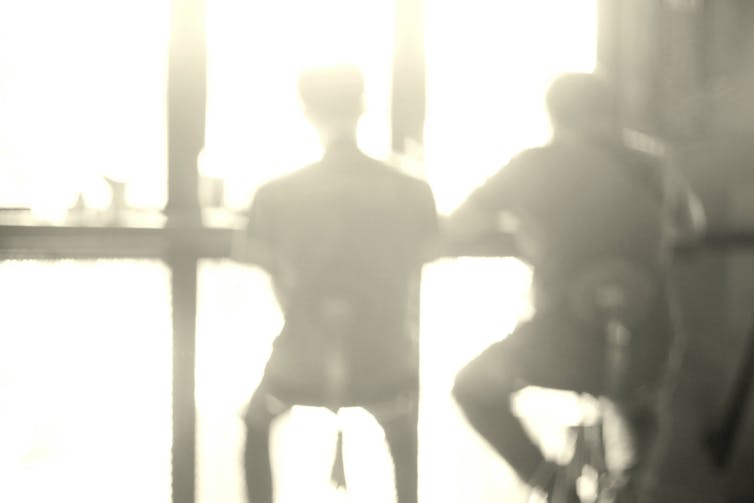
Andrew Tate – online content creator, podcaster, former kickboxer, and subject of ongoing human trafficking investigations – has gained widespread influence with millions of men and boys. Tate promotes financial independence, being “mentally and physically strong,” and being successful with women, interspersed with (sometimes violent) misogyny.
For my PhD research, I worked with 30 boys and young men aged between 16 and 19 from working-class backgrounds in Belfast, researching on the role of social connection to protect mental health. In the interviews I carried out, Tate’s name came up constantly.
I found that almost all the participants had positive or mixed feelings about him. Even those less certain of him appreciated his financial advice or advocacy for men’s mental health. While other masculinity influencers were also mentioned, none achieved the same level of importance.
But I also found that youth workers emerged as powerful counters, acting as “anti-Andrew Tate” figures and providing a positive example of manhood. This shows that, while the influence of online figures may seem unstoppable, we already have role models in our communities who can demonstrate an alternative version of what a man can be and how he should act with others.
Looking for connection
In their interviews, the young men spoke passionately about their enthusiasm for Andrew Tate and valued his advocacy for “traditional” manhood, including the classical ideal of a “strong mind in a strong body”. While none of the boys and young men endorsed Tate’s misogyny, they struggled to balance their discomfort with calling women property against his perceived valuable messages.
I agree with some of the stuff he says, but not everything he says. So, with some of the stuff he says about men’s mental health, if you go to the gym, it can help, and eat well, that… all the stuff around men’s mental health, I believe in. But just some of the stuff he says about women being property and stuff like that, I don’t really properly agree with.
The boys and young men drew a parallel between Tate’s childhood poverty and their own. They sometimes assigned Tate unexpectedly altruistic intentions in his targeting of young men desperate to attain financial security.
All the controversial things that he says, I think he only said that to get himself a platform, so people would tune into him… More and more people listen to him. And he’s making more and more money. And he’s like, putting that money into his university, trying to help more people and then he promotes mental health and all. I think it’s brilliant like.
Most of the people in my research had histories of substance use and violence at the boundaries between Catholic and Protestant neighbourhoods from a young age. For them, these challenging experiences were their entry into the youth work organisations which mentored them to build skills in emotional literacy, forecast the consequences of unsafe or unhealthy behaviour, and build community cohesion through acts of service.
Relatable and non-judgmental
For the boys and young men I worked with, their youth workers were like them – working-class men from their own communities with shared experiences of socioeconomic deprivation, exposure to paramilitary violence, and early substance use. Those parallels made them trustworthy and relatable.

The youth workers offered a confidential, nonjudgmental ear for their mentees, without the same risk of consequences for bad behaviour. For instance, telling a youth worker about having used drugs at the weekend wouldn’t lead to the lecture or loss of privileges that telling a parent or teacher might.
I just think that, you know, at a young age, it’s important, em, young men get to know that there is that supportive people that can turn to even if they haven’t got, you know, a lot of friends or any friends. But I just think that, you know, like, I’ve got the opportunity of the youth club and the youth groups.
In contrast to the version of masculine success Tate presents, youth workers usually had a home in the neighbourhood, played sports recreationally, and were establishing their families through marriage and having children. My study participants admired the stability their youth workers demonstrated in this more attainable – but still aspirational – version of adult manhood.
When asked what kind of man they wanted to be as an adult, most of them described the sort of success their youth workers had achieved, rather than a version closer to Tate’s.
The boys and young men I worked with said that youth service organisations were supportive spaces. They credited them with both improvements to their mental health and with giving them strategies to avoid engagement in sectarian violence. Some participants were so moved by their engagement with youth workers that they were themselves training in the profession.
Despite strong evidence for their value, youth services are consistently underfunded. But they represent an opportunity to invest in the health of both young men and their communities.
Amanda Dylina Morse does not work for, consult, own shares in or receive funding from any company or organisation that would benefit from this article, and has disclosed no relevant affiliations beyond their academic appointment.
This article was originally published on The Conversation. Read the original article.







